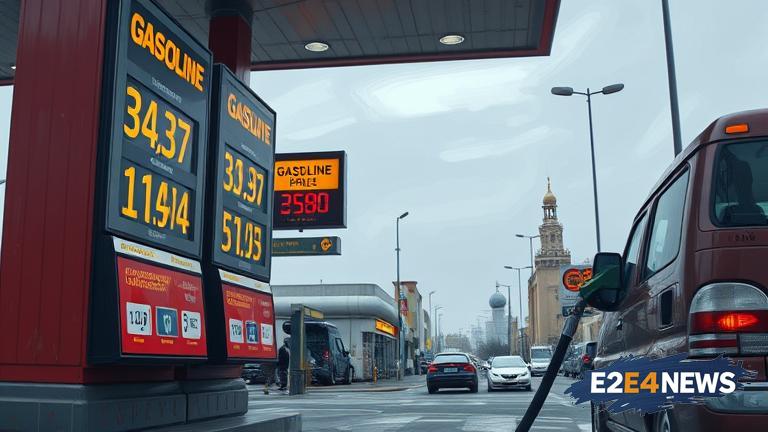Russian gasoline prices have hit a record high, with the average cost of a liter of gasoline reaching 55.5 rubles, according to recent data. This surge in prices is attributed to a combination of global market trends and domestic factors, including the ongoing conflict in Ukraine and Western sanctions imposed on Russia. The country’s energy sector has been impacted significantly, leading to a shortage of refined petroleum products. As a result, Russian drivers are feeling the pinch, with many expressing frustration over the rising costs. The Russian government has attempted to intervene, implementing price controls and subsidies to mitigate the effects of the price hike. However, these measures have had limited success, and prices continue to climb. The global market has also played a significant role in the price increase, with the cost of crude oil rising due to geopolitical tensions and supply chain disruptions. The situation is further complicated by the fact that Russia is a major oil producer, but its refining capacity is limited, making it reliant on imports of refined products. The record high prices are not only affecting Russian consumers but also having a broader impact on the economy, with inflation rising and economic growth slowing. The Russian central bank has raised interest rates in an attempt to curb inflation, but the move is expected to have a limited impact on the oil market. Meanwhile, the Russian government is exploring alternative sources of refined petroleum products, including imports from other countries. However, this strategy is fraught with challenges, including logistical difficulties and potential quality control issues. The situation is being closely watched by international observers, who are concerned about the potential implications for global energy markets. The price hike is also having a significant impact on Russian businesses, particularly those in the transportation sector, which are struggling to absorb the increased costs. Some companies are being forced to raise their prices, which is likely to have a ripple effect throughout the economy. The Russian government is under pressure to find a solution to the crisis, with many calling for more drastic measures to be taken. However, the situation is complex, and there are no easy answers. The global energy market is highly interconnected, and events in one part of the world can have far-reaching consequences. As the situation continues to unfold, it remains to be seen how the Russian government will respond and what the long-term implications will be for the country’s economy and energy sector. The record high gasoline prices are a symptom of a broader set of challenges facing the Russian energy sector, including aging infrastructure and a lack of investment in new technologies. To address these challenges, the Russian government will need to develop a comprehensive strategy that takes into account both domestic and international factors. This will require careful planning and coordination with international partners, as well as a commitment to investing in the country’s energy infrastructure. The situation is a reminder of the complexities and uncertainties of the global energy market, where events can unfold rapidly and have significant consequences for economies and societies around the world.
